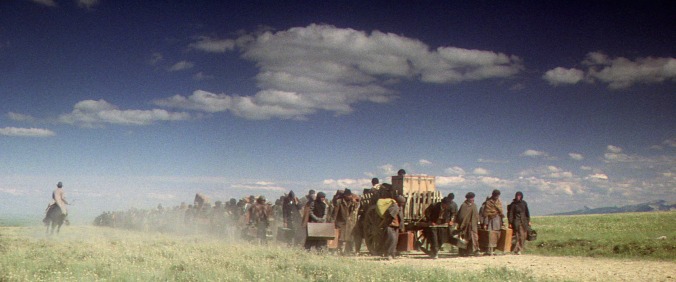One of Hollywood’s biggest flops ever is a masterpiece—especially in its extended cut

Watch This offers movie recommendations inspired by new releases, premieres, current events, or occasionally just our own inscrutable whims. This week: With the fabled Snyder Cut improbably making its way to HBO Max this week, we’re looking back on other significant directors’ cuts.
Heaven’s Gate, director’s cut (2012)
Heaven’s Gate, the King Kong of auteur flops, makes no bones about its grandiose ambitions—that much is obvious from the pomp and pageantry that opens the film. Throwing their top hats in the air as they bump and tussle behind a marching band, the rowdy Harvard class of 1870 swarms into a convocation hall. The long crane shot, with hundreds of extras, is presided over by Joseph Cotten of Citizen Kane and The Magnificent Ambersons—in a reverend’s collar, no less, as though his cameo alone weren’t enough to sanctify the proceedings. Then, after a full five minutes of speeches, it’s on to “The Blue Danube” (on which 2001: A Space Odyssey may as well own the copyright) and an elaborate waltz sequence that reviewers at the time would recognize as partly cribbed from Vincente Minnelli’s Madame Bovary.
That critics already had it out for the movie’s writer-director, Michael Cimino, is no secret. In the two years that followed the release of his Best Picture winner, The Deer Hunter (1978), he had acquired a reputation as an on-set tyrant. To make matters worse, he was a pathological fabulist who lied about serving in Vietnam and basically did everything to conceal the fact that he was in his 40s and had been a very successful director of TV commercials before he turned to the big screen. He was too old and too square to be an enfant terrible. In later years, long after Heaven’s Gate had become a Hollywood byword for disaster, he got so much plastic surgery that he became unrecognizable.
Yet Heaven’s Gate—the restored cut, rather than the severely truncated wide-release version—is a tremendous piece of filmmaking. Realistically, there was no way that a 219-minute period epic about class warfare budgeted at $44 million (about $140 million in today’s dollars) was going to be anything but a box office bomb, and cutting it down to an indecipherable 149 minutes didn’t help: It was the biggest flop in Hollywood history until the release of Cutthroat Island some 15 years later. This may be theoretically offensive to accountants; it is not clear why it should offend anyone else.
The subject matter is expansive, mythic, and to some extent uncommercial. The Johnson County War, in which the Wyoming Stock Growers Association hired gunmen and “cattle detectives” to kill small-time homesteaders and ranchers—leading to a standoff and an intervention from President Benjamin Harrison (not on behalf of the little guy)—is a historical episode unflattering to capitalism and domestic American power. Cimino started pitching what became Heaven’s Gate as soon as he arrived in Hollywood in 1971. The film bears little resemblance to real events: Cimino changes the class conflict, adds Eastern European immigrants, and makes his protagonist, Jim Averill (Kris Kristofferson), a Harvard grad. This is, in other words, a movie about false promises.
After the extended graduation ceremony that opens the film, we jump forward 20 years and find an older, beaten down Averill now working as a marshal in Johnson County. The poor, huddled masses are arriving by the thousand. A killer named Nate Champion (Christopher Walken, wearing weird, vampy eyeshadow) stalks the wide open, David Lean-esque landscape. The word of the cattle barons—a group that happens to include Averill’s alcoholic college buddy Billy (John Hurt)—is law. It would be an understatement to say that Cimino draws out the plot, which isn’t all that complicated; more than an hour passes before we meet some of the main characters, including Ella (Isabelle Huppert), the county madam, and J.B. (Jeff Bridges), the owner of the local cockfighting establishment.
Could it use some tightening up? Definitely not—the jumbo-sized, megalomaniacal sweep, which completely envelops the conflicts and cast, is what Heaven’s Gate is all about. However obvious Cimino’s influences might be, there’s nothing ersatz about his sense of grandeur and scale. There’s a unique thrill to watching the camera follow a character outside, pushing through a window to reveal, in widescreen, an honest-to-goodness steam locomotive whistling through what appears to be a full-sized 19th-century town. Scenes crowded with extras luxuriate in dances, roller rinks, sieges, and other forms of choreographed circular motion.
It really does take the complete, seemingly limitless running time to appreciate the scope of the film’s sweeping, romanticized vision. That being said, its spellbinding qualities are evident even in a clip, and the fact that critics back in 1980 dogpiled it with worst-movie-ever hyperbole only makes this writer’s wretched, parasitic profession look worse. Was it really the worst thing they’d ever seen or just the most hopelessly expensive? One wishes it really did bankrupt a studio. Alas, that part of the Heaven’s Gate myth isn’t true.
Availability: The 219-minute version of Heaven’s Gate is available to rent or purchase digitally from Amazon, Apple, and VUDU.